Related Research Articles

Organometallic chemistry is the study of organometallic compounds, chemical compounds containing at least one chemical bond between a carbon atom of an organic molecule and a metal, including alkali, alkaline earth, and transition metals, and sometimes broadened to include metalloids like boron, silicon, and selenium, as well. Aside from bonds to organyl fragments or molecules, bonds to 'inorganic' carbon, like carbon monoxide, cyanide, or carbide, are generally considered to be organometallic as well. Some related compounds such as transition metal hydrides and metal phosphine complexes are often included in discussions of organometallic compounds, though strictly speaking, they are not necessarily organometallic. The related but distinct term "metalorganic compound" refers to metal-containing compounds lacking direct metal-carbon bonds but which contain organic ligands. Metal β-diketonates, alkoxides, dialkylamides, and metal phosphine complexes are representative members of this class. The field of organometallic chemistry combines aspects of traditional inorganic and organic chemistry.
A transition metal carbene complex is an organometallic compound featuring a divalent organic ligand. The divalent organic ligand coordinated to the metal center is called a carbene. Carbene complexes for almost all transition metals have been reported. Many methods for synthesizing them and reactions utilizing them have been reported. The term carbene ligand is a formalism since many are not derived from carbenes and almost none exhibit the reactivity characteristic of carbenes. Described often as M=CR2, they represent a class of organic ligands intermediate between alkyls (−CR3) and carbynes (≡CR). They feature in some catalytic reactions, especially alkene metathesis, and are of value in the preparation of some fine chemicals.
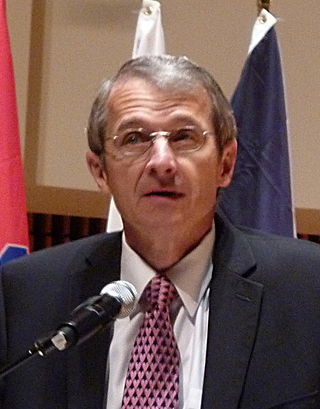
Richard Royce Schrock is an American chemist and Nobel laureate recognized for his contributions to the olefin metathesis reaction used in organic chemistry.
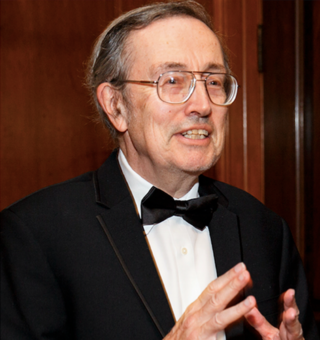
Robert Howard Crabtree is a British-American chemist. He is serving as Conkey P. Whitehead Professor Emeritus of Chemistry at Yale University in the United States. He is a naturalized citizen of the United States. Crabtree is particularly known for his work on "Crabtree's catalyst" for hydrogenations, and his textbook on organometallic chemistry.

Malcolm Leslie Hodder Green was Professor of Inorganic Chemistry at the University of Oxford. He made many contributions to organometallic chemistry.
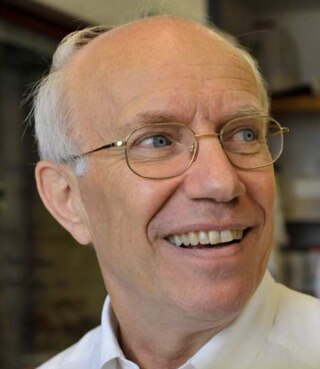
Pierre Braunstein is a French chemist. He was director of the Laboratoire de Chimie de Coordination of Strasbourg (France) and is a member of the French Academy of Science.
Transition metal carbyne complexes are organometallic compounds with a triple bond between carbon and the transition metal. This triple bond consists of a σ-bond and two π-bonds. The HOMO of the carbyne ligand interacts with the LUMO of the metal to create the σ-bond. The two π-bonds are formed when the two HOMO orbitals of the metal back-donate to the LUMO of the carbyne. They are also called metal alkylidynes—the carbon is a carbyne ligand. Such compounds are useful in organic synthesis of alkynes and nitriles. They have been the focus on much fundamental research.
Armando José Latourrette de Oliveira Pombeiro is a Portuguese chemical engineer.
Gregory S. Girolami is the William H. and Janet G. Lycan Professor of Chemistry at the University of Illinois at Urbana-Champaign. His research focuses on the synthesis, properties, and reactivity of new inorganic, organometallic, and solid state species. Girolami has been elected a fellow of the American Association for the Advancement of Science, the Royal Society of Chemistry, and the American Chemical Society.
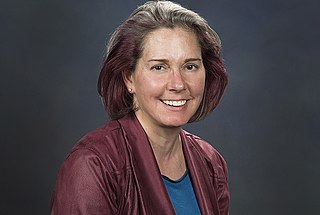
Jaqueline Kiplinger is an American inorganic chemist who specializes in organometallic actinide chemistry. Over the course of her career, she has done extensive work with fluorocarbons and actinides. She is currently a Fellow of the Materials Synthesis and Integrated Devices group in the Materials Physics and Applications Division of Los Alamos National Laboratory (LANL). Her current research interests are focused on the development of chemistry for the United States’ national defense and energy needs.
Karen Ila Goldberg is an American chemist, currently the Vagelos Professor of Energy Research at University of Pennsylvania. Goldberg is most known for her work in inorganic and organometallic chemistry. Her most recent research focuses on catalysis, particularly on developing catalysts for oxidation, as well as the synthesis and activation of molecular oxygen. In 2018, Goldberg was elected to the National Academy of Sciences.
William B. Tolman an American inorganic chemist focusing on the synthesis and characterization of model bioinorganic systems, and organometallic approaches towards polymer chemistry. He has served as Editor in Chief of the ACS journal Inorganic Chemistry, and as a Senior Investigator at the NSF Center for Sustainable Polymers. Tolman is a Fellow of the American Association for the Advancement of Science and the American Chemical Society.
T. Don Tilley is a professor of chemistry at the University of California, Berkeley.
Gregory Lee Hillhouse was an inorganic chemist with a long-standing interest in the chemistry of organotransition metal compounds at the University of Chicago. Much of his work focused on creating organometallic compounds to stabilize and isolate reactive intermediates, molecules that are proposed to exist briefly during a larger catalytic reaction progress.
Jenny Yue-fon Yang is an American chemist. She is an associate professor of chemistry at the University of California, Irvine where she leads a research group focused on inorganic chemistry, catalysis, and solar fuels.
Mary Rakowski DuBois is an inorganic chemist, now retired from Pacific Northwest National Laboratory (PNNL). She made multiple contributions to inorganic and organometallic chemistry, focusing on synthetic and mechanistic studies. In recognition of her scientific contributions, she received several awards.
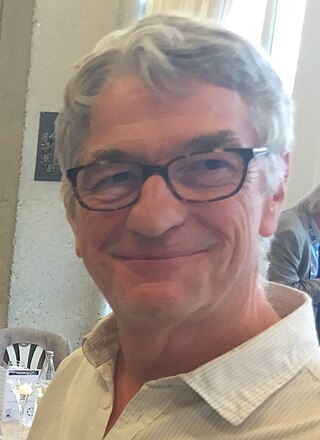
Bruno Chaudret, born on 25 December 1953, is a French chemist and director of research at the CNRS. His research is in organometallic chemistry, particularly the interactions between hydrogen and transition metals.
Karsten Meyer is a German inorganic chemist and Chair of Inorganic and General Chemistry at the Friedrich-Alexander University of Erlangen-Nürnberg (FAU). His research involves the coordination chemistry of transition metals as well as uranium coordination chemistry, small molecule activation with these coordination complexes, and the synthesis of new chelating ligands. He is the 2017 recipient of the Elhuyar-Goldschmidt Award of the Spanish Royal Society of Chemistry, the Ludwig-Mond Award of the Royal Society of Chemistry, and the L.A. Chugaev Commemorative Medal of the Russian Academy of Sciences, among other awards. He also serves as an Associate Editor of the journal Organometallics since 2014.
Connie C. Lu is a Taiwanese-American inorganic chemist and a professor of chemistry at the University of Minnesota, Twin Cities. Lu's research focuses on the synthesis of novel bimetallic coordination complexes, as well as metal-organic frameworks. These molecules and materials are investigated for the catalytic conversion of small molecules like as N2 and CO2 into value-added chemicals like ammonia and methanol. Lu is the recipient of multiple awards for her research, including the National Science Foundation CAREER Award and the Sloan Research Fellowship in 2013, and an Early Career Award from the University of Minnesota's Initiative for Renewable Energy and the Environment in 2010.

Paula L. Diaconescu is a Romanian-American chemistry professor at the University of California, Los Angeles. She is known for her research on the synthesis of redox active transition metal complexes, the synthesis of lanthanide complexes, metal-induced small molecule activation, and polymerization reactions. She is a fellow of the American Association for the Advancement of Science.
References
- 1 2 3 "Daniel J. Mindiola | Department of Chemistry". www.chem.upenn.edu.
- 1 2 3 "Mindiola Group". mindiolagroup.chem.upenn.edu.
- ↑ "Mindiola Group". mindiolagroup.chem.upenn.edu.
- 1 2 3 http://mindiolagroup.chem.upenn.edu/content/documents/CVMindiola_April2018complete.pdf [ bare URL PDF ]
- 1 2 "Mindiola Group". mindiolagroup.chem.upenn.edu.
- ↑ "ACS Scholar alumnus: Daniel Mindiola". Archived from the original on 2021-06-24. Retrieved 2021-06-23.
- ↑ K. T. Smith, S. Berritt, M. González-Moreiras, S. Ahn, M. R. Smith 3rd, M.-H. Baik, D. J. Mindiola, Catalytic borylation of methane, Science 351, 1424–1427 (2016). https://www.science.org/doi/10.1126/science.aad9730
- ↑ D. J. Mindiola, Oxidatively Induced Abstraction Reactions. A Synthetic Approach to Low-Coordinate and Reactive Early Transition Metal Complexes Containing Metal−Ligand Multiple Bonds, Acc. Chem. Res. 39, 813-821 (2006). https://pubs.acs.org/doi/10.1021/ar0500113